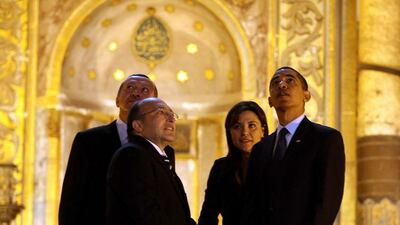ISTANBUL // Barack Obama's visit to Turkey this week marked the start of an effort by the United States to rebuild its image and regain trust in the Muslim world. But years of lost credibility because of the Iraq war and unconditional US support for Israel in the Middle East conflict mean the goodwill created by the president's trip is fragile and will have to be strengthened by concrete actions, analysts say.
"He ended the Bush era in Turkey," the Turkish newspaper Hurriyet said in a headline yesterday, adding: "With Obama towards a new world."
"His remarks were received very well" in Turkey as well as in other Muslim states in the region, said Semih Idiz, a foreign policy commentator for the Milliyet daily newspaper. He said people were impressed by the fact that Mr Obama, in reaching out to the Muslim world, took the risk of repeatedly talking about the Muslim part of his own family, "something that could be damaging for him at home". Mr Obama's father was born a Muslim, although he became an atheist before Mr Obama's birth.
During his two-day stay in Turkey, Mr Obama stressed the readiness of the United States to listen to Muslim nations and the need for co-operation to defeat extremism. The president underlined the strategic significance of Turkey as a democracy with a predominantly Muslim population in an important corner of the world and repeatedly spoke out in favour of EU membership for Turkey. The president also called on both Israelis and Palestinians to work for peace in the Middle East, telling a meeting with students in Istanbul that mothers on both sides of the conflict wanted their children to be safe from violence. "And so sometimes I think that if you just put the mothers in charge for a while, that things would get resolved," he said in remarks that were widely quoted in the Turkish press yesterday. Hurriyet and many other Turkish newspapers were full of pictures of the US president touring the Blue Mosque in Istanbul. In many media reports about Mr Obama's visit to Istanbul, the president's remark that he wanted to end a discussion round with students before the midday call to prayer featured prominently, as it was regarded as Now that Mr Obama has won over many Muslims with his stated "desire for dialogue", his administration is expected to show that it means what it says, Mr Idiz said. "The acid test will be the Middle East." If the United States stands firmly by the two-state solution even though the new Israeli government is backing away from that plan, it would regain credibility. But if the United States were to back down as well, then Mr Obama's efforts would not be translated into a more permanent trust in Washington's sincerity, Mr Idiz said. "People will say: 'Oh, we just heard nice words'." Turkey's leaders, officials and observers were impressed with what they saw and heard. "I believe a new era has begun in Turkish-American relations," the prime minister, Recep Tayyip Erdogan, said. Istanbul's mufti, Mustafa Cagrici, who showed Mr Obama around the Blue Mosque, praised Mr Obama's willingness to learn about the 17th-century building. "We have had many visitors in this mosque," Mr Cagrici told the Zaman newspaper. "But I have not seen another visitor who listened with such intense attention to the explanations given to him." Nuzhet Kandemir, a former Turkish ambassador to Washington, said Mr Obama had succeeded in sending clear messages and had done so in an "acceptable way". Mr Kandemir was referring to the president's call on Turkey to do more for its religious and ethnic minorities and to improve relations with neighbouring Armenia. "From the point of view of rebuilding America's image that had suffered an erosion, it was very successful," Mr Kandemir told the Cumhuriyet daily. Some politicians in the Middle East praised Mr Obama's clear commitment to the two-state solution and his clear statement, made in a speech before Turkey's parliament, that the United states will never be at war with Islam. "It comes as an important first step," Egypt's foreign minister, Ahmed Aboul Gheit, said about the speech. He said Mr Obama's address would be helpful in "rebuilding bridges of confidence between the US and more than a billion Muslims around the world". Syria's foreign minister, Walid al Moallem, was quoted as saying that the words of the president were "important" and positive". The minister, speaking to the Lebanese newspaper As Safir, stressed that Mr Obama supported the two-state solution, but that the new Israeli government under Benjamin Netanjahu, the prime minister, did not. "We need to see how the United States will deal with an Israeli government representing the extreme Right" that "continues to reject the two-state solution". The Palestinians' chief negotiator, Saeb Erakat, also said it was important that Mr Obama had underlined the need for a two-state solution. But Israel's environment minister, Gilad Erdan, who is close to Mr Netanjahu, said: "Israel does not take orders from President Obama." tseibert@thenational.ae

